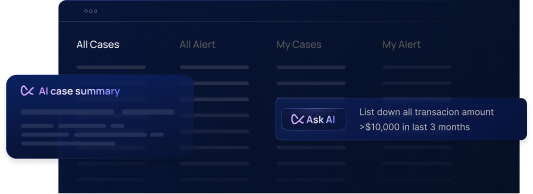Effective AML compliance requires accurately screening for sanctions, politically exposed persons (PEPs), and adverse media. Two algorithms: Jaro-Winkler and Levenshtein, often come up in discussions about fuzzy matching. Knowing when and why to use each can significantly boost your AML screening effectiveness and operational efficiency.
How Do They Work?
- Levenshtein Distance calculates the minimum number of single-character edits (insertions, deletions, substitutions) required to change one word into another. For example, changing "Mohammad" to "Muhammad" requires two edits.
- Jaro-Winkler Similarity emphasizes the similarity of strings, particularly at the start, making it excellent for identifying minor misspellings or common variations. For example, “Jon Smith” and “John Smith” produce a high similarity score

When to Use Jaro-Winkler
Use Jaro-Winkler when:
- Screening individual customer names with common typos or spelling variations.
- Dealing with transliteration variations (e.g., Arabic or Cyrillic names).
- High processing speed and efficiency are critical for short strings and real-time checks.
Recommended for:
- Retail and consumer banks
- Payment processors
- Remittance services
- Digital wallets
When to Use Levenshtein
Use Levenshtein when:
- Screening longer strings like company names, addresses, or descriptions.
- Precise differences in every character count equally.
- Matching complex business names and identifying changes in entity details.
Recommended for:
- Corporate and institutional banks
- Correspondent banks
- Merchant onboarding processes
- B2B fintech services
Pros and Cons Overview

Regulatory Perspective
Regulators like FinCEN do not prescribe specific algorithms but emphasize screening systems must effectively handle variations, aliases, and typographical errors. The effectiveness of your algorithm and your ability to justify its usage during regulatory reviews is what truly matters.
How Flagright Handles It
Flagright provides users the flexibility to select and configure their preferred matching algorithm - Jaro-Winkler or Levenshtein, alongside advanced options such as tokenization, special character handling, and stopword management. Our AI technology complements this approach by significantly reducing false positives, leveraging contextual understanding and advanced analytics to streamline compliance processes:
- User-selectable algorithms tailored to specific screening requirements.
- Advanced settings including tokenization, special character management, and stopword control.
- AI-driven false positive reduction of up to 98% through contextual analysis.
- Fully transparent and explainable decision-making with complete audit trails.
Final Recommendations
Your choice between Jaro-Winkler and Levenshtein depends on the nature of your screening requirements. Consider Jaro-Winkler for efficient, real-time screening of individuals, and opt for Levenshtein when precision and complexity matter more, such as business and merchant names.
Ultimately, the best compliance outcomes result from combining these algorithmic choices with intelligent AI-driven false positive handling; exactly the approach offered by Flagright.
Ready to see how Flagright’s AI‑driven fuzzy‑matching and false‑positive reduction can transform your AML screening? Request a personalized demo and start cutting through noise.




.svg)























